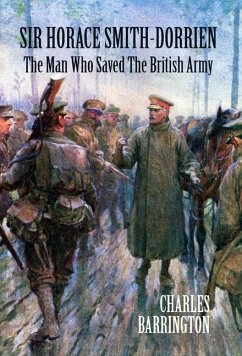Smith-Dorrien and French were very different. Smith-Dorrien, an infantryman, was a 'Soldier of Empire', living through that remarkable period when England rose to global superpower before the cataclysm of the Great War. Having fought alongside French, a cavalryman, in South Africa, Smith-Dorrien's approach to military training put the two men increasingly at odds. Their relationship came to a head when Smith-Dorrien took the decision to fight at Le Cateau. As the BEF faced the German onslaught French came under increasing pressure. He could not blame Kitchener and so his ire fell on Smith-Dorrien, a potential rival. Sir Horace understood his troops, however, in a way that few of his contemporaries did. In re-telling his story, the author seeks to show that by his leadership he was not a 'donkey' leading lions, but a lion among lions. Charles Barrington's first book was about his grandfather in 'J' Battery, RHA, in 1914. Charles went to Wellington but has never been a soldier himself. After qualifying as an accountant he had a career in the City before becoming a consultant and a writer. As his grandmother used to say, there is only one muscle you need to keep fit - the one between your ears. "Whenever I see the Short Magazine Lee Enfield rifle I realise what a far-sighted man Horace Smith-Dorrien was. There is nothing especially notable about the weapon except that it was carried by all British soldiers throughout the Great War, becoming the symbol of that vast struggle. The fact that every soldier was expected to become an expert with his rifle was entirely Smith-Dorrien's doing. An infantryman to his fingertips, he had faced spears in Zululand, jezails on the North West Frontier and snipers in South Africa. So by the time he took over at Aldershot in 1907, he was battle hardened and could foresee the shape of a European war. It is Smith-Dorrien's conduct in that war upon which the author concentrates, describing the bitter resentment harboured by French. Certainly Smith-Dorrien had his faults, but it is the crisis in the autumn of 1914, when the future not just of the BEF but of the Alliance itself was at a tipping point, that is carefully unpicked by the author. Today Smith-Dorrien lies in an unremarkable grave, apparently forgotten. Far lesser officers have been lauded with monuments, but not 'The Man Who Saved The British Army.' I much enjoyed Charles Barrington's book. It should become a seminal work on one of this country's greatest, if neglected, heroes: do buy it." Patrick Mercer OBE
Hinweis: Dieser Artikel kann nur an eine deutsche Lieferadresse ausgeliefert werden.
Hinweis: Dieser Artikel kann nur an eine deutsche Lieferadresse ausgeliefert werden.








